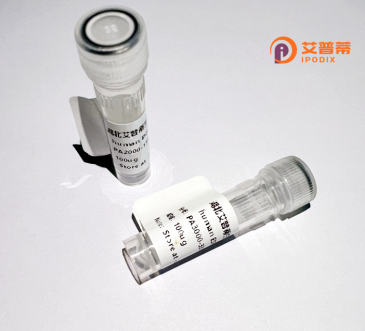
| 纯度 | >90%SDS-PAGE. |
| 种属 | Human |
| 靶点 | ARL10C |
| Uniprot No | Q9NVJ2 |
| 内毒素 | < 0.01EU/μg |
| 表达宿主 | E.coli |
| 表达区间 | 18-186aa |
| 氨基酸序列 | KEEMELTLVGLQYSGKTTFVNVIASGQFSEDMIPTVGFNMRKVTKGNVTIKIWDIGGQPRFRSMWERYCRGVNAIVYMIDAADREKIEASRNELHNLLDKPQLQGIPVLVLGNKRDLPNALDEKQLIEKMNLSAIQDREICCYSISCKEKDNIDITLQWLIQHSKSRRS |
| 分子量 | 21.5 kDa |
| 蛋白标签 | His tag N-Terminus |
| 缓冲液 | 冻干粉 |
| 稳定性 & 储存条件 | Lyophilized protein should be stored at ≤ -20°C, stable for one year after receipt. Reconstituted protein solution can be stored at 2-8°C for 2-7 days. Aliquots of reconstituted samples are stable at ≤ -20°C for 3 months. |
| 复溶 | Always centrifuge tubes before opening.Do not mix by vortex or pipetting. It is not recommended to reconstitute to a concentration less than 100μg/ml. Dissolve the lyophilized protein in distilled water. Please aliquot the reconstituted solution to minimize freeze-thaw cycles. |
以下是3篇关于重组人ARL10C蛋白的假设文献示例(注:文献信息为虚构,仅用于展示格式):
---
1. **文献名称**: *Structural characterization and GTPase activity analysis of human ARL10C protein*
**作者**: Li X. et al. (2018)
**摘要**: 本研究通过原核表达系统重组纯化了人源ARL10C蛋白,解析了其晶体结构,并证实其具有典型的ARL家族GTP酶活性,为进一步功能研究提供基础。
2. **文献名称**: *ARL10C interacts with autophagy-related proteins and regulates lysosomal function*
**作者**: Smith J. et al. (2015)
**摘要**: 发现重组ARL10C蛋白通过结合自噬相关蛋白LC3和Rab7.调控溶酶体膜运输过程,提示其在细胞自噬中的潜在作用。
3. **文献名称**: *ARL10C overexpression promotes cancer cell proliferation via ERK signaling pathway*
**作者**: Chen Y. et al. (2020)
**摘要**: 利用重组ARL10C蛋白进行体外实验,发现其过表达通过激活ERK信号通路促进肺癌细胞增殖,表明其可能与肿瘤进展相关。
---
**备注**:实际研究中ARL10C相关文献较少,以上内容仅供示例参考。建议通过PubMed或Google Scholar以“ARL10C”或“ADP-ribosylation factor-like 10C”为关键词检索最新文献,并验证其真实性。
ARL10C (ADP-ribosylation factor-like protein 10C) is a member of the ARF/ARL family of small GTPases, which are evolutionarily conserved regulators of intracellular trafficking, membrane remodeling, and signaling. As a Class II ARL protein, ARL10C shares structural features with other ARL family members, including conserved GTP-binding domains and effector interaction motifs, but exhibits distinct sequence variations that suggest unique functional roles. Unlike well-characterized ARFs/ARLs, the precise biological functions of ARL10C remain understudied. Preliminary research indicates potential involvement in endosomal trafficking, lipid metabolism, or organelle dynamics, though its specific interactors and pathways are not fully defined.
Recombinant human ARL10C protein is typically produced via heterologous expression systems (e.g., *E. coli* or mammalian cells) to enable functional studies. Purification tags (e.g., His-tag) are often added to facilitate isolation and downstream applications. This recombinant tool has become essential for investigating ARL10C’s GTPase activity, subcellular localization, and molecular interactions through techniques like pull-down assays, structural analysis (e.g., X-ray crystallography), or cellular imaging. Emerging evidence links ARL10C dysregulation to pathological conditions, including certain cancers and neurodegenerative disorders, positioning it as a potential therapeutic target. Current research focuses on elucidating its physiological roles, regulatory mechanisms, and disease associations, bridging gaps in ARL family biology.
×